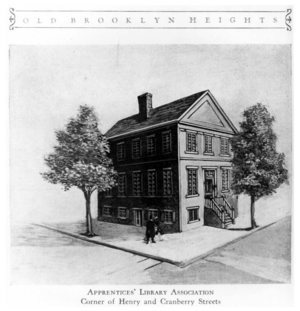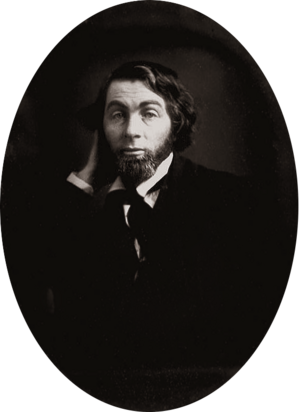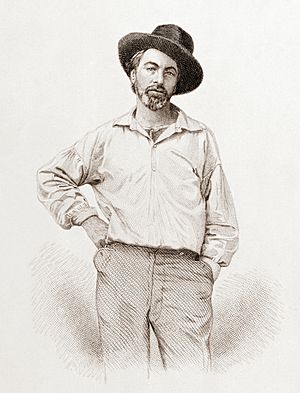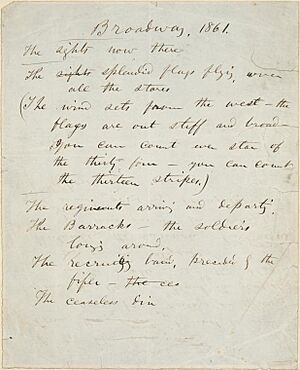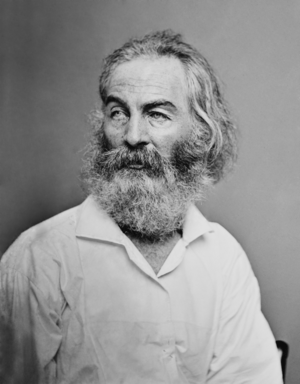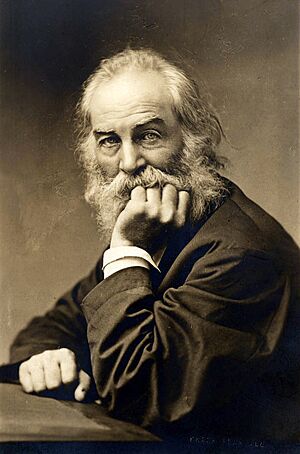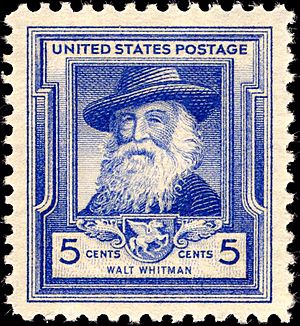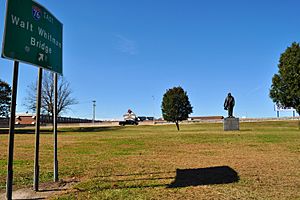Walt Whitman facts for kids
Quick facts for kids
Walt Whitman
|
|
|---|---|
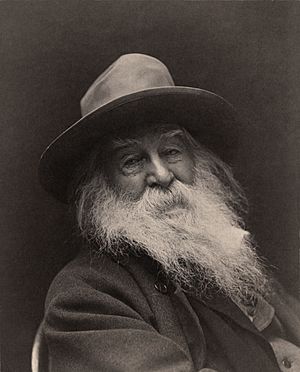
Whitman in 1887
|
|
| Born |
Walter Whitman Jr.
May 31, 1819 Huntington, New York, U.S.
|
| Died | March 26, 1892 (aged 72) Camden, New Jersey, U.S.
|
| Resting place | Harleigh Cemetery, Camden, New Jersey, U.S. |
| Occupation |
|
| Signature | |
Walter Whitman Jr. (born May 31, 1819 – died March 26, 1892) was an American poet, writer, and journalist. He is known as one of the most important poets in American literature and even world literature. Whitman used both spiritual ideas (called transcendentalism) and realistic descriptions in his writing. He is often called the father of free verse, a style of poetry without a regular rhyme or rhythm. His most famous work, Leaves of Grass, first published in 1855, was very new and different for its time.
Whitman was born in Huntington, New York on Long Island. He lived in Brooklyn for much of his childhood and career. He left school at age 11 to work and help his family. He had many jobs, including journalist, teacher, and government clerk. He paid for the first printing of Leaves of Grass himself. This book aimed to connect with everyday Americans and tell their stories in an epic way. Whitman kept working on and changing Leaves of Grass until he passed away in 1892.
During the American Civil War, Whitman went to Washington, D.C., and helped care for wounded soldiers in hospitals. His poems often explored themes of loss and healing. After the assassination of Abraham Lincoln, whom Whitman greatly admired, he wrote famous poems like "O Captain! My Captain!" and "When Lilacs Last in the Dooryard Bloom'd". He also gave talks about Lincoln. Later in life, after a stroke, Whitman moved to Camden, New Jersey. His health slowly declined, and when he died at 72, many people attended his funeral.
Whitman's poetry still has a big impact today. Many people see him as a poet who truly captured the spirit of America. Art historian Mary Berenson said, "You cannot really understand America without Walt Whitman, without Leaves of Grass." Poet Ezra Pound called him "America's poet." The Poetry Foundation describes him as "America's world poet," like a modern-day Homer or Shakespeare.
Contents
Walt Whitman's Life and Work
Walt Whitman's Early Life and Education
Walt Whitman was born on May 31, 1819, in West Hills, New York. He was the second of nine children. His parents, Walter and Louisa Van Velsor Whitman, had English and Dutch backgrounds. He was called "Walt" to tell him apart from his father. When he was four, his family moved to Brooklyn. They moved many times because of money problems. Whitman remembered his childhood as often difficult due to these struggles.
One special memory he had was when the Marquis de Lafayette lifted him up and kissed him on the cheek. This happened during a celebration in Brooklyn on July 4, 1825. Lafayette was helping to lay the cornerstone for the Brooklyn Apprentices' Library. Whitman later worked as a librarian at this very place.
At age 11, Walt stopped going to school to help his family earn money. He worked as an office boy for lawyers. Later, he became an apprentice at a newspaper called the Patriot. There, he learned how printing presses worked and how to set type for printing. He might have written small stories for the paper.
Walt Whitman's Career as a Writer and Editor
After working at the Patriot, Whitman worked for other printers in Brooklyn. His family moved back to Long Island, but Walt stayed in Brooklyn. He got a job at the Long-Island Star, a popular newspaper. While there, he often visited the local library, joined a debate club, and started going to theater shows. He also published some of his first poems without using his name.
In May 1835, at age 16, Whitman moved to New York City to work as a typesetter. He had trouble finding steady work because of a big fire in the printing area and a tough economy. In 1836, he returned to his family in Hempstead, Long Island. For a while, he taught at different schools, but he didn't enjoy it much.
After teaching, Whitman went back to Huntington, New York, and started his own newspaper, the Long-Islander. He did everything himself: publishing, editing, printing, and even delivering the papers. After ten months, he sold the newspaper. He then worked as a typesetter for another paper in Jamaica, Queens.
In the 1840s, Whitman moved to New York City and worked for various newspapers. From 1846 to 1848, he was the editor of the Brooklyn Eagle. During this time, he wrote a lot about music and became a big fan of Italian opera. He later said that opera greatly influenced his unique writing style in free verse.
Whitman also wrote short stories and poems for magazines. He left the Brooklyn Eagle in 1848 because of disagreements about politics. He supported a group within the Democratic party that was against the expansion of slavery into new territories. This group was concerned about how slavery would affect free workers.
He published two short novels, Franklin Evans (1842) and The Half-Breed (1846). In 1852, he wrote another story, Life and Adventures of Jack Engle, which appeared in parts in a newspaper.
Creating Leaves of Grass
Whitman decided he wanted to be a poet who wrote in a new way. Around 1850, he started writing what would become Leaves of Grass. This was a collection of poems he would keep working on for the rest of his life. He wanted to create a truly American epic poem, using free verse with a rhythm inspired by the Bible. In June 1855, he surprised his family with the first printed edition of his book.
Whitman paid for the first edition of Leaves of Grass himself. It was printed at a local shop during the workers' breaks. There were 795 copies made. The book didn't have an author's name on the title page, but inside, he called himself "Walt Whitman, an American." The book began with a long introduction and included twelve poems. The first and longest poem was later called "Song of Myself".
The famous writer Ralph Waldo Emerson greatly praised the book. He wrote a kind letter to Whitman and told his friends how wonderful it was. Emerson called it "the most extraordinary piece of wit and wisdom that America has yet contributed." He had been looking for a truly American poet, and he felt Whitman was it.
Leaves of Grass became very popular, partly because of Emerson's praise. However, some people found the poems very bold and new, and even a bit shocking for the time. Whitman even put a quote from Emerson's letter, "I greet you at the beginning of a great career," on the cover of the second edition without asking permission. This was one of the first "blurbs" on a book cover!
Just a few days after Leaves of Grass was published, Whitman's father passed away in July 1855. In the months that followed, some critics focused on the poems' bold themes. Even though the second edition was ready, the publisher almost didn't release it. It finally came out in August 1856 with 20 new poems. Whitman continued to revise and re-release Leaves of Grass many times until his death. Famous writers like Henry David Thoreau admired his work and visited him.
During these years, Whitman faced money problems and worked as a journalist again for the Daily Times in Brooklyn. He edited the paper, wrote book reviews, and editorials. He left that job in 1859.
Walt Whitman's Role During the Civil War
As the American Civil War began, Whitman published his poem "Beat! Beat! Drums!" to encourage support for the Union. His brother George joined the Union army and sent Whitman letters describing the battles. In December 1862, Whitman saw a list of wounded soldiers and worried his brother George was among them. He immediately traveled south to find him. He eventually found George alive, with only a minor cheek wound.
Seeing the many wounded soldiers and the difficult conditions deeply affected Whitman. He decided to stay in Washington, D.C., starting in December 1862. There, he found part-time work in an army office, which allowed him time to volunteer as a nurse in the army hospitals. He wrote about these experiences in "The Great Army of the Sick" and later in a book called Memoranda During the War.
Whitman's family faced sadness in late 1864. His brother George was captured by Confederate forces, and another brother, Andrew Jackson, passed away. Whitman also had to help his brother Jesse, who needed special care. However, Whitman's spirits lifted when he got a better government job in the Bureau of Indian Affairs in January 1865. A month later, George was released from capture. In May, Whitman received a promotion and published a new collection of poems called Drum-Taps.
In June 1865, Whitman was transferred from his government job. His friend William Douglas O'Connor strongly defended Whitman and helped him get a new position in the Attorney General's office. O'Connor also wrote a book called The Good Gray Poet, which helped make Whitman more popular and gave him his famous nickname. During this time, Whitman also published "O Captain! My Captain!", a well-known poem about the death of Abraham Lincoln. This was the only poem of his that appeared in school books during his lifetime.
At the Attorney General's office, Whitman interviewed former Confederate soldiers who were seeking pardons. He found these conversations very interesting. In 1866, he took time off to prepare a new edition of Leaves of Grass, which came out in 1867. In 1868, his poems were published in England and became very popular there. Another edition of Leaves of Grass was released in 1871. Whitman stayed at the Attorney General's office until 1872. That year, he also cared for his elderly mother and gave a speech at Dartmouth College.
Later Years and Passing
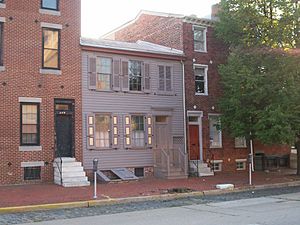
In early 1873, Whitman had a stroke that caused paralysis. He moved from Washington to live with his brother George in Camden, New Jersey. His mother, who was also ill, passed away that same year in May. These events made Whitman very sad. He lived with his brother for many years, during which he was very productive, publishing three more versions of Leaves of Grass. He also met famous people like Oscar Wilde and Thomas Eakins at his brother's home.
In 1884, Whitman bought his own house at 328 Mickle Street (now 330 Dr. Martin Luther King Jr. Boulevard) in Camden. He was cared for by tenants and later by Mary Oakes Davis, a widow who became his housekeeper. She brought her pets, making the house lively. During this time, Whitman continued to publish new editions of Leaves of Grass in 1876, 1881, and 1889.
He also spent time in the peaceful community of Laurel Springs, New Jersey, between 1876 and 1884. He used one of the farm buildings as his summer home. This home is now a museum. He wrote about the beautiful lake there, calling it "the prettiest lake in: either America or Europe."
As 1891 ended, Whitman prepared a final edition of Leaves of Grass, known as the "Deathbed Edition." He wrote that the book was "at last complete" after 33 years of work. He also had a granite mausoleum built for himself, shaped like a small house, and visited it often. In his last week, he was very weak and in constant pain.
Walt Whitman passed away on March 26, 1892, at his home in Camden, New Jersey, at age 72. He had been ill for a long time. A public viewing of his body was held at his home, and over 1,000 people came to pay their respects. His coffin was covered in flowers. Four days later, he was buried in his tomb at Harleigh Cemetery in Camden. A public ceremony was held at the cemetery, with speeches and music. His friend, Robert G. Ingersoll, gave the eulogy. Later, his parents and two brothers were also buried in the mausoleum.
Walt Whitman's Writing Style
Whitman's writing style was very new and different for his time. He broke away from traditional poetry rules, often writing in a prose-like way. His poems used unique images and symbols, like rotting leaves and tufts of straw. He is often called the father of free verse, even though he didn't invent it.
Walt Whitman's Poetic Ideas
In the introduction to the 1855 edition of Leaves of Grass, Whitman wrote: "The proof of a poet is that his country absorbs him as affectionately as he has absorbed it." He believed that poets and society had a strong, connected relationship. He showed this connection in "Song of Myself" by using a powerful first-person voice. This poem was an American epic that spoke for ordinary people, rather than focusing on a single hero. Leaves of Grass also explored how fast-growing cities affected people.
Walt Whitman's Beliefs
Walt Whitman's Views on Religion
Whitman was deeply influenced by the idea of deism, which means believing in a creator God who set the universe in motion but doesn't interfere. He believed all faiths were equally important and respected them all. In "Song of Myself," he listed major religions and showed he accepted them. He also said, "I adopt each theory, myth, god, and demi-god." Whitman was a religious skeptic, meaning he questioned traditional religious beliefs. He saw God as present everywhere and believed the human soul was immortal and always growing. He was considered a pantheist, someone who sees God in everything in the world.
Walt Whitman's Thoughts on Shakespeare
Whitman was interested in the idea that someone other than William Shakespeare of Stratford-upon-Avon might have written Shakespeare's famous plays. In 1888, Whitman wrote that the plays seemed to come from a time of powerful European kings and queens. He felt that only someone from that noble background could have written such amazing works.
Walt Whitman's Stance on Slavery
Whitman was against the expansion of slavery in the United States. He supported the Wilmot Proviso, which aimed to prevent slavery in new territories. He believed that slavery would harm free white workers and northern businesses. He felt that the Southern states should put the nation's interests first. In 1856, he wrote that the South would either "abolish slavery or it will abolish you."
Walt Whitman's Vision for America
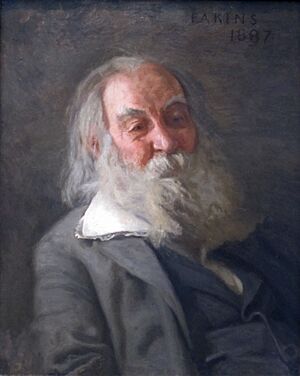
Whitman is often called America's national poet because he helped create an image of the United States for itself. He celebrated democracy and equality in his poems. He believed in a strong and unified America. In 1883, he spoke about the future of American identity, saying that indigenous and Spanish-Indian cultures would play a key role. He believed America should embrace all contributions, including its unique native cultures.
Walt Whitman's Legacy and Influence
Whitman is considered the first "poet of democracy" in the United States. This title shows his ability to write in a uniquely American way. Andrew Carnegie called him "the great poet of America so far." Whitman saw himself as a very important figure in poetry.
Literary critic Harold Bloom wrote that if you are American, "then Walt Whitman is your imaginative father and mother." He believed that Leaves of Grass is as central to American culture as other great works like Moby-Dick or Adventures of Huckleberry Finn.
In his own time, Whitman had many followers and admirers. One group, called the Eagle Street College, formed in England in 1885 just to read and discuss his poetry. They even held an annual "Whitman Day" celebration. Whitman's niece, Jessie Louisa Whitman, also helped preserve his legacy by sharing her memories of him in interviews.
Influence on American Poets
Whitman is one of the most influential American poets. Modernist poet Ezra Pound called Whitman "America's poet." Poet Langston Hughes saw Whitman as a literary hero. Whitman's free-spirited lifestyle inspired the Beat movement in the 1950s and 1960s, including writers like Allen Ginsberg and Jack Kerouac. Anti-war poets like Adrienne Rich also found inspiration in his work. Lawrence Ferlinghetti called himself one of Whitman's "wild children." Poet laureate Joy Harjo also counts Whitman among her influences.
Influence on Latin American Poets
Whitman's poetry also influenced poets in Latin America and the Caribbean in the 19th and 20th centuries. Cuban poet José Martí published essays about Whitman's writings in 1887. Later, translations by Álvaro Armando Vasseur made Whitman even more known in Latin America. Poets like César Vallejo from Peru, Pablo Neruda from Chile, and Jorge Luis Borges from Argentina all recognized Whitman's impact on their work.
Influence on European Authors
Some European writers, like Oscar Wilde and Edward Carpenter, saw Whitman as a prophet of a better future and of strong friendships. Whitman also influenced Bram Stoker, the author of Dracula. Stoker even said that Dracula was based on Whitman, with whom he exchanged letters.
Walt Whitman in Film and Television
Whitman's life and poems have appeared in many movies and TV shows. In Dead Poets Society (1989), a teacher played by Robin Williams inspires his students with Whitman's works.
In the movie Beautiful Dreamers (1992), Whitman, played by Rip Torn, visits a hospital where his ideas are used to help patients.
Whitman's poem "Yonnondio" inspired both a book (Yonnondio: From the Thirties, 1974) by Tillie Olsen and a short film (Yonnondio, 1994).
His poem "I Sing the Body Electric" (1855) was used by Ray Bradbury for a short story and a collection of stories. Bradbury's story was even made into an episode of The Twilight Zone in 1962. This poem also inspired the big finale in the movie Fame (1980).
Walt Whitman in Music and Audio Recordings
More than 500 composers have set Whitman's poetry to music. This makes him one of the most frequently set American poets. Famous composers like Leonard Bernstein, Benjamin Britten, and Ralph Vaughan Williams have used his poems. An opera called Crossing, inspired by Whitman's Civil War diaries, premiered in 2015.
In 2014, a German publisher released an audio book of his "Children of Adam" poems, with readings by famous voices like Iggy Pop. Also in 2014, composer John Zorn released an album called On Leaves of Grass, dedicated to Whitman.
Places Named After Walt Whitman
Whitman's importance in American culture is shown by the many schools, roads, rest stops, and bridges named after him. These include Walt Whitman High School in Maryland and another in New York, and Walt Whitman Boulevard in Cherry Hill, New Jersey.
The Walt Whitman Bridge, which crosses the Delaware River between Philadelphia and Gloucester City, New Jersey, opened in 1957. A statue of Walt Whitman by Jo Davidson stands at the entrance to the bridge. There was some discussion about naming the bridge after him, but his name was chosen to honor him.
In 1997, the Walt Whitman Community School opened in Dallas, becoming the first private high school for LGBT youth. Other places include the Walt Whitman Shops near his birthplace and Walt Whitman Road on Long Island.
Whitman was added to the New Jersey Hall of Fame in 2009. In 2013, he was honored in the Legacy Walk in Chicago, which celebrates LGBT history. A summer camp in New Hampshire, Camp Walt Whitman, opened in 1948. There is even a crater on the planet Mercury named after him.
Walt Whitman's Works
- The Half-Breed; A Tale of the Western Frontier (1846)
- Life and Adventures of Jack Engle (serialized in 1852)
- Leaves of Grass (1855, the first of seven editions through 1891)
- Drum-Taps (1865)
- Democratic Vistas (1871)
- Memoranda During the War (1876)
- Specimen Days (1882)
- The Wound Dresser: Letters written to his mother from the hospitals in Washington during the Civil War, edited by Richard M. Bucke (1898)
- The Half-Breed and other stories by Walt Whitman (1927).
Works Compiled by Horace Traubel
The following works were put together by Horace Traubel, who spent time with Whitman. They include Traubel's notes and observations, as well as Whitman's writings, poems, and letters.
- Traubel, Horace (1906). With Walt Whitman in Camden (March 28—July 14, 1888) (vol. 1). Boston: Small, Maynard & Company.
- Traubel, Horace (1908). With Walt Whitman in Camden (vol. 2).
- Traubel, Horace (1914). With Walt Whitman in Camden (1888-1889) (vol. 3). New York: Mitchell Kennerley.
- Traubel, Horace (1924). Walt Whitman on Himself: From the Camden Diary of Horace Traubel. New York: Alfred A. Knopf.
- Traubel, Horace (1953). With Walt Whitman in Camden: January 21 to April 7, 1889 (vol. 4) Sculley Bradley, ed. Philadelphia: University of Pennsylvania Press.
- Traubel, Horace (1964). With Walt Whitman in Camden (vol. 5). Edited by Gertrude Traubel.
- Traubel, Horace (1982). With Walt Whitman in Camden (vol. 6). Edited by Gertrude Traubel.
- Traubel, Horace (1992). With Walt Whitman in Camden (vol. 7).
- Traubel, Horace (1996). With Walt Whitman in Camden (vol. 8).
- Traubel, Horace (1996). With Walt Whitman in Camden (vol. 9).
- Wineapple, Brenda, ed. (2019). Walt Whitman Speaks: His Final Thoughts on Life, Writing, Spirituality, and the Promise of America as told to Horace Traubel. New York: Library of America.
See also
 In Spanish: Walt Whitman para niños
In Spanish: Walt Whitman para niños
 | Mary Eliza Mahoney |
 | Susie King Taylor |
 | Ida Gray |
 | Eliza Ann Grier |


